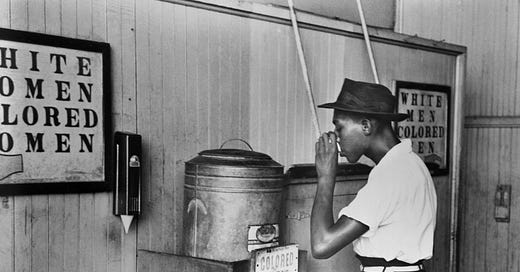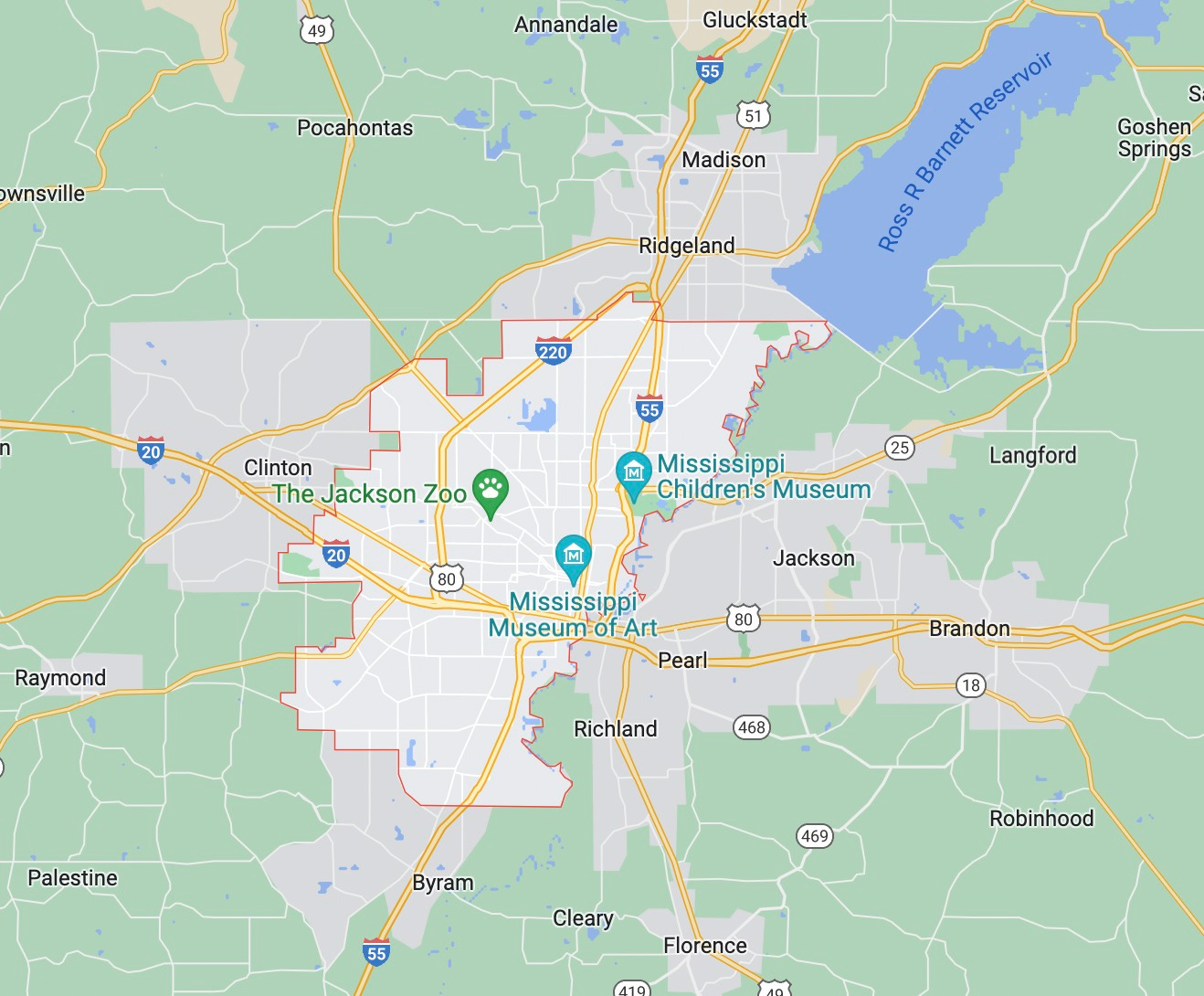I remember how I felt back in 2005 when Hurricane Katrina hit New Orleans. When the national news showed footage of Black people standing on rooftops holding signs that read "HELP US" hastily scrawled on cardboard. The people pleaded with their bodies and their signs, sure as the helicopters flew over that their government was coming for them. Would help them. Instead the government flew by.
I remember feeling cognitive dissonance: This is America?
What did you feel?
_____
That week back in 2005, over thirty thousand mostly Black New Orleans residents streamed into the Louisiana Superdome, a building whose roof would leak, whose air-conditioning and refrigeration would fail, and where, without enough food, water, restrooms, or restroom supplies, evacuated residents would live for five days.
As the Superdome grew more dank, with a stench that was a mixture of rotting food, urine, and feces, the government relocated people to the Houston Astrodome, over 350 miles away from their homes, a state away. The Astrodome and the wherewithal of Houston's local government saved the day and saved lives. Some evacuees would stay for weeks. Some for months.
In the first few days that the Astrodome was operating as a shelter, former First Lady Barbara Bush toured it and remarked publicly, "So many of the people in the arena here, you know, were underprivileged anyway, so this is working very well for them."
I learned in those days and weeks what had not and would not be done to protect the mostly Black residents of New Orleans' Ninth Ward who were the people most impacted by the waters of Katrina and rising devastation.
_____
Fast forward to the terrible 2017 hurricane season when Harvey, Irma, and Maria hit back-to-back in September and October of that year. Alarming in its own right was how then-President Trump behaved toward the peoples of Texas and Florida as they coped with hurricanes Harvey and Irma respectively, versus the people of Puerto Rico which was hit by Maria.
For example, he visited both Texas and Florida four days after the hurricanes made landfall, but it was thirteen days from the onslaught of Maria before he paid Puerto Rico a visit. And when he finally did make his way to the island and visited an aid-distribution center, he behaved with a peculiar jocularity and tossed rolls of paper towels into a crowd of people eager for relief.
Weeks after Maria hit Puerto Rico, barely half of all residents had access to drinking water.
Drinking water turns out to be in short supply when disaster hits.
Sometimes a lack of drinking water is the disaster itself.
Which brings us to 2022 and Jackson, Mississippi.
_____
My friend Jeanette lives and works in Jackson. She's an artist, and an administrator at The Lighthouse | Black Girl Projects, a nonprofit that supports Black girls and women. She's been giving me the play by play on what's happening in her city of 150,000, the state capital, where the drinking water has been compromised for weeks, and over 80% of the residents are Black. Jeanette is White.
The latest incarnation of a decades-old problem with Jackson's water began in early July, she tells me. People turned on their kitchen faucet or bathroom taps and cloudy water or a dark liquid you wouldn't even call water came out. Due to burst pipes the water was contaminated with e.coli and other bacteria, and lead. Because the water utility system in the capital city of Mississippi by all accounts has been left to rot.
Why?
And then in late August torrential rains came through and overwhelmed the city's water plant, and so in addition to the water being contaminated, the water pressure was reduced to nil so the water just stopped coming.
Why?
Because infrastructure has not been upgraded in Jackson.
Why?
Because property values in Jackson don't support a livable infrastructure.
Why?
Mississippi is the nation’s poorest state, and Jackson is an impoverished city. In the midst of this crisis, Gov. Tate Reeves (R) has tried to shift the blame to the city’s leadership, stating that “water is not free,” and floating a proposal to privatize the water system in Jackson. But the water crisis is about more than a lack of funds. There are many (majority White) areas of Mississippi where the water and sewer systems are well-maintained, so such crises do not occur. In fact, Mississippi has a long history of White political leaders purposefully, and sometimes illegally, steering needed funding away from Black communities. In response, Black Mississippians have demanded access to clean water and public services, recognizing that these are fundamental civil rights issues. - Washington Post, 9/13/22
"Friends say, 'You don't have to stay in Jackson. You work remote. Why don't you leave?'" Jeanette tells me. "And I'm like, I'm not gonna leave. That's the problem. White people leave and don't fight for the people who are here and when Whites leave it drops property values."
Jeanette gives me a brief history lesson. "That's what happened going back to 1969, when Mississippi was finally forced to desegregate its public schools, and Black students started attending Central High School in downtown Jackson. White people immediately started to flee to the suburbs, which reduced land values in the city, because in a conspiracy of racism among lenders, realtors, appraisers, and residents, land value goes down when White people leave an area." Soon, the people who lived and worked and went to school in Jackson were primarily Black. Today, Jackson is over 80% Black.
"So 1969 is the beginning of this water saga," says Jeanette. "When you reduce the land values, there aren't enough property taxes to pay to keep the infrastructure upgraded. Also, the highest land values in Jackson are the state and federal buildings in downtown, but because they're government buildings they don't pay taxes."
Even when the federal government allocates infrastructure money to the state, which it has in this case, the state gets to decide whether to give the money to its cities. Jeanette adds that the White republican governor Tate Reeves tends to turn back most federal aid because 'we don't need a handout.'
And yet, they do.
Used with permission from Jeanette (@luvblkgrls and @wr1tergurl).
You can hear NPR's exploration of the history of Jackson's water problem, in conversation with Environmental Protection Agency Administrator Michael Regan, who happens to be the EPA's first Black head, here.
_____
Forget the governmental shit show for a second. Conjure Jackson. A city you can find on a map, just like yours.
Conjure the faces of the humans who make their homes there. They are men and women and nonbinary people, children, adults, and seniors, single and married, healthy and sick, striving for a life that feels good to them, just like you and yours.
For over six weeks now, the good people of Jackson have been under a "boil water" advisory because their tap water is unfit not just to drink, but to use for cooking, making ice, washing dishes, or brushing teeth. Children are told it's time for "a bird bath" - where they stand and are sprinkled with water, rather than getting a proper bath. Children in America in 2022. I can't wrap my head around that. Can you?
And when the tap delivers water that is not just cloudy, but brown, boiling it isn't an option. People must rely on distributions of bottled water at sites around the city. People say they are eating out more than perhaps they can afford, because water use at home is close to impossible.
Federal infrastructure funding has allocated $30 million to Jackson, but the governor of Mississippi has to decide to unlock it. And that hasn't yet happened.
_____
This isn't a 'we just had a hurricane' situation. This is a 'our city's water infrastructure no longer supports the basic necessities of human life' situation. In our America.
I don't have the systemic answers. The EPA is now investigating. I just know that the good people of Jackson, Mississippi have been without water for six weeks in the latest crisis that is a part of a systemic problem in Jackson for decades. I also know that if these folks lived in a predominantly White city, this problem would have been fixed in an instant or would never have been allowed to deteriorate to this point in the first place.
In the meantime, you can help. Join me in donating money to the Mississippi Rapid Response Coalition - Water Fund so our fellow Americans can quench their thirst, cook their food, wash their dishes, bathe their bodies, flush their toilets, and reassure their children that there are in fact good people out there who are thinking about them: click here.
🏡You've been in Julie's Pod, an online community of over 12,000 people who want to open up, be vulnerable, learn and grow, and in so doing help others learn and grow. You can subscribe here. (It's free. Subscribing just means that you'll get me in your inbox so you don't have to go searching for what I said next.)
🪴The Julie's Pod community grows fastest when you share this post with a friend. So think about who might want to read it, and forward it to them. If you want to just provide the link, it's here.
✍ If you left a comment on any post before today, I've probably responded. The comments are always thoughtful and fantastic. Please feel welcome to join the conversation. For those who can't comment publicly, I've set up a hotline 1-877-HI-JULIE where you can leave an anonymous voicemail to let me know what's on your mind.
🧐 If you're interested in my work more broadly, check out my website and everywhere that social media happens I'm @jlythcotthaims.
💪🏽 I'm running for Palo Alto City Council to help people in my city have an affordable place to live and to advocate for us all being better neighbors supporting each other in thriving. Check out our campaign here.
😘 If you've read this far, you are definitely entitled to a free "Julie's Pod" sticker for your laptop or water bottle courtesy of me and the U.S. Postal Service. Just DM me your snail mail address (or if you don't know how to DM a person, just email me@lythcott-haims.com). I promise I will toss your snail mail address in the trash as soon as I pop the sticker in the mail to you!
*Disclaimer: I am not a physician, psychologist, or counselor, nor am I licensed to offer therapy or medical advice of any kind. What you get from me is a fellow human with a lot of thoughts and opinions based solely on my lived experience. If you are having an emergency or are in crisis please call 988 or the National Suicide Prevention Line (800-273-8255) or text the Crisis Text Line at 741741. I want you to get the help you need.
© 2022 Love Over Time LLC All Rights Reserved
📸 Cover Photo Credit: Getty Images/Bettmann/Contributor









